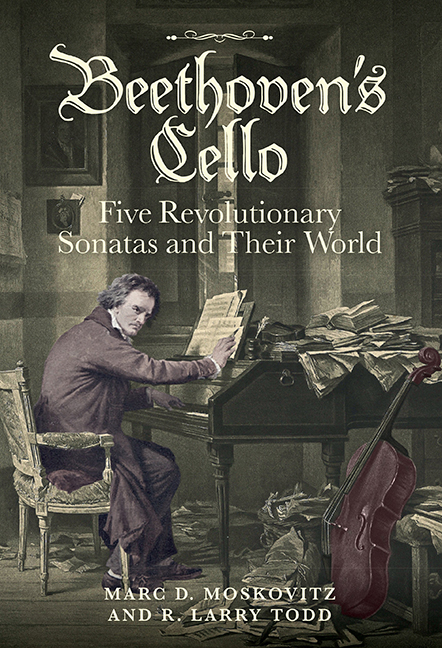Book contents
- Frontmatter
- Dedication
- Epigraph
- Contents
- Illustrations
- Foreword by Steven Isserlis
- Preface
- Personalia
- 1 From Bonn to Berlin
- 2 Music Fit for a King: The Sonata in F major Op. 5 No. 1 (1796)
- Interlude: Beethoven's Cellos
- 3 Tragic/Comic Masks: The Sonata in G minor Op. 5 No. 2 (1796)
- Interlude: Beethoven's Pianos
- 4 Themes and Variations
- Interlude: The Triple Concerto as Outlier
- 5 Friendship, War, Tears, and Grief: The Sonata in A major Op. 69 (1808)
- 6 Freedom and Control: The Sonata in C major Op. 102 No. 1 (1815)
- 7 ‘Most Remarkable and Strange’: The Sonata in D major Op. 102 No. 2 (1815)
- Interlude: Arranged Sonatas
- 8 Opus Posthumum
- Appendix 1 Primary Sources of Beethoven's Music for Cello and Piano
- Appendix 2 Reviews of Beethoven's Cello Music by His Contemporaries
- Notes
- Bibliography
- Index of Works by Beethoven
- General Index
6 - Freedom and Control: The Sonata in C major Op. 102 No. 1 (1815)
Published online by Cambridge University Press: 18 April 2018
- Frontmatter
- Dedication
- Epigraph
- Contents
- Illustrations
- Foreword by Steven Isserlis
- Preface
- Personalia
- 1 From Bonn to Berlin
- 2 Music Fit for a King: The Sonata in F major Op. 5 No. 1 (1796)
- Interlude: Beethoven's Cellos
- 3 Tragic/Comic Masks: The Sonata in G minor Op. 5 No. 2 (1796)
- Interlude: Beethoven's Pianos
- 4 Themes and Variations
- Interlude: The Triple Concerto as Outlier
- 5 Friendship, War, Tears, and Grief: The Sonata in A major Op. 69 (1808)
- 6 Freedom and Control: The Sonata in C major Op. 102 No. 1 (1815)
- 7 ‘Most Remarkable and Strange’: The Sonata in D major Op. 102 No. 2 (1815)
- Interlude: Arranged Sonatas
- 8 Opus Posthumum
- Appendix 1 Primary Sources of Beethoven's Music for Cello and Piano
- Appendix 2 Reviews of Beethoven's Cello Music by His Contemporaries
- Notes
- Bibliography
- Index of Works by Beethoven
- General Index
Summary
FROM SEPTEMBER 1814 to June 1815, Vienna played host to Napoleon's conquerors - the King of Prussia, Tsar of Russia, Emperor of Austria, and ministers of the English and (restored) French Bourbon monarchs, accompanied by retinues of aristocrats, military commanders, and assorted dignitaries - all intent upon redrawing the European map and determining the continent's future. The Congress of Vienna, as this lavish spectacle was known, was effectively the first international summit of the major European powers. By day, royalty and diplomats crisscrossed Vienna's cobbled streets in tailored finery and handsome fiacres and convened at the Hofburg and nearby palatial residences, where the main players negotiated, bargained, and haggled as they began reconfiguring Napoleon's shattered empire. By night, the Habsburg capital thrummed with the ‘sparkling chaos’ of masked balls, sumptuous banquets, concerts and intrigue. In addition to foreign nobles, invited delegates, and self-appointed representatives, Vienna opened its gates to perhaps as many as one hundred thousand visitors. The composer whose name was on many of their lips, including those of royalty, was Beethoven.
Festivities celebrated at the congress included Beethoven's refashioned opera Leonore, now titled Fidelio, performed already that September 1814 before several heads of state, and another concert of his music presented on 29 November before a large, enthusiastic audience that included the King of Prussia, Empress of Austria, and Tsarina of Russia. This event, which featured Beethoven's Seventh Symphony, the patriotic, crowd-pleasing Wellingtons Sieg (‘Wellington's Victory’), and a new cantata, Der glorreiche Augenblick (‘The Glorious Moment’), with its triumphant orchestral opening and reassuring, massed chorus acclamation ‘Europa steht’ (‘Europe stands’), was repeated twice during the following month. Then, in January of the new year, Beethoven appeared before an illustrious audience to perform his song ‘Adelaide’. The concert, in honor of the tsarina, whose birthday was being fêted, proved to be among Beethoven's final public appearances as a pianist.
The composer was now at the height of his international fame. Indeed, in February 1815, London was treated to a performance of Wellington's Victory under Sir George Smart that was repeated three days later. Yet while Beethoven's reputa tion had spread well beyond the Habsburg realms, his private world was steadily shrinking on account of his deafness.
- Type
- Chapter
- Information
- Beethoven's Cello: Five Revolutionary Sonatas and Their World , pp. 125 - 145Publisher: Boydell & BrewerPrint publication year: 2017



